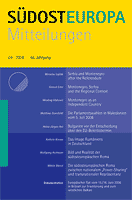After the Referendum: Montenegro, Serbia and the Regional Context
After the Referendum: Montenegro, Serbia and the Regional Context
Author(s): Gernot ErlerSubject(s): Politics / Political Sciences
Published by: Südosteuropa Gesellschaft e.V.
Summary/Abstract: While the issue at stake at Montenegro’s referendum for independence was far-reaching and the people in Montenegro deeply divided over the question of independence, the democratic conduct and outcome of the referendum is a sign of political maturity of all relevant political forces in Montenegro, according to the Minister of State at the German Federal Foreign Office. The governments in Podgorica and in Belgrade have now an obligation to continue working closely together for the sake of their citizens and to find solutions for the outstanding questions, like, among others, the functions and properties of the army, economic cooperation, property rights, citizenship, education, health care, taxation and social security. Montenegro needs a reconciliation process across the domestic dividing line in order to free the way for a new political agenda: mainly strengthening administrative capacities and reform policies, combating organised crime and corruption. Serbia faces an even more demanding political agenda: the dissolution of the State Union, the difficult Kosovo status talks and the necessary full cooperation with the ICTY as a precondition for resuming SAA negotiations. With Montenegro, on the other hand, SAA negotiations will be taken up soon. With relation to Serbia, Erler puts some stress on the Kosovo issue, as the main regional concern, where a solution of the status question has to be reached soon. Erler recalls the need for much more readiness for compromise in Belgrade and Prishtina alike in the ongoing negotiation process.
Journal: Südosteuropa Mitteilungen
- Issue Year: 2006
- Issue No: 04
- Page Range: 12-17
- Page Count: 6
- Language: English
- Content File-PDF

